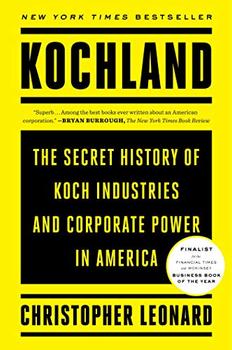Summary | Excerpt | Reviews | Beyond the Book | Readalikes | Genres & Themes | Author Bio
The Secret History of Koch Industries and Corporate Power in America

Critics' Opinion:
Readers' Opinion:
First Published:
Aug 2019, 704 pages
Paperback:
Oct 2020, 704 pages
 Book Reviewed by:
Book Reviewed by:
Kim Kovacs
Buy This Book
As the argument between these visions drags on in a stalemate, the modern American economy is one that favors giant companies over the small, and the politically connected over the independent. More than anything, it favors companies that can master complexity—the complexity of interconnected and global marketplaces, and the complexity of wide-reaching, intrusive regulatory regimes.
Charles Koch frequently derides the current political era as one of "crony capitalism," but the company he built is perfectly suited to thrive in this environment. Koch Industries employs an army of legal experts to navigate the extensive legal intrusion of the state. A similarly large group of market analysts and traders navigate the fractured and byzantine markets of energy products. It is revealing that Koch Industries expands, almost exclusively, into businesses that are uncompetitive, dominated by monopolistic firms, and deeply intertwined with government subsidies and regulation.
To take just one example: Koch derives much of its profits from oil refineries. The entire economy depends on refined oil, but no one has built a new oil refinery in the United States since 1977. The industry is dominated by entrenched players who run aged facilities at near-full capacity, reaping profits that are among the highest in the world. A single refinery shutdown causes gasoline prices to spike across entire regions of the United States. The underlying cause of this dysfunction is a set of loopholes in the Clean Air Act, a massive set of regulations passed in 1963 (and significantly expanded in 1970) that imposed pollution controls on new refineries. The legacy oil refiners, including Koch, exploited arcane sections of the law that allowed them to expand their old facilities while avoiding clean-air standards that would apply to new facilities. This gave them an insurmountable advantage over any potential new competitor. The absence of new refineries to stoke competition and drive down prices meant that Americans paid higher prices for gasoline.
Koch Industries has applied its profits to maximum advantage. In 2018, the company's headquarters campus in Wichita resembled a fortified kingdom. The facility was expanded in 2014, with the addition of several thousand square feet of office space in buildings arrayed at the base of the iconic Koch Tower—a large building with black windows and gleaming dark granite. The renovation also included the installation of a tall, earthen wall surrounding the north side of the campus. A local city street was diverted around the wall, at Koch's expense, to keep passersby at a safe distance. Seldom has a company gained such deep reach into so many Americans' lives while simultaneously walling itself away into an insular community.
Koch Industries' employees arrive to work early, creating small traffic jams at entrances to the campus, under the watch of security guards. Many of them enter Koch Tower through an underground pedestrian tunnel, passing a series of photo collages that memorialize Koch's history. They reach an underground lobby and an elevator bank, where the portrait of Charles Koch hangs on the wall. It is one of those composite portraits, made of countless tiny images that combine to form a larger picture. The tiny images are of Koch's employees; the larger picture is Charles Koch. Across the lobby, employees shop at the company store, called Hot Commodities, where they can buy coffee or an audio CD relating the history of founder Fred Koch. There is a magazine rack stocked with glossy copies of the company newsletter, called Discovery, which regularly features columns by Charles Koch.
When each employee is hired, he or she undergoes a multiday training session to learn the tenets of Charles Koch's philosophy, Market-Based Management, or MBM as they call it. Charles Koch says the philosophy is a blueprint for achieving prosperity and freedom. It is equally applicable to business ventures, personal habits, and national government. Adherence to the creed is nonnegotiable for anyone who remains at Koch Industries. Charles Koch, in one of his books, writes that an "act of conversion" is necessary for MBM to be effective. It cannot be adopted in bits and pieces. The Ten Guiding Principles of MBM are printed and hung above cubicles throughout company headquarters. When employees get free coffee in the break room, the Guiding Principles are printed on their disposable cups. The employees learn MBM's vocabulary and speak a language among themselves that only they truly understand. They drop phrases like "mental models," "experimental discovery," and "decision rights," that instantly convey deep meaning to insiders. The employees become more than employees; they become citizens of an institution with its own vocabulary, its own incentives, and its own goals in the world. The financial success of Koch Industries only reinforces the idea that what they are doing is right and that the tenets of MBM are indeed the key to proper living.
From KOCHLAND: The Secret History of Koch Industries and Corporate Power in America by Christopher Leonard. Copyright © by Christopher Leonard. Reprinted by permission of Simon & Schuster, Inc.





The Flower Sisters
by Michelle Collins Anderson
From the new Fannie Flagg of the Ozarks, a richly-woven story of family, forgiveness, and reinvention.

The House on Biscayne Bay
by Chanel Cleeton
As death stalks a gothic mansion in Miami, the lives of two women intertwine as the past and present collide.

The Funeral Cryer by Wenyan Lu
Debut novelist Wenyan Lu brings us this witty yet profound story about one woman's midlife reawakening in contemporary rural China.
Your guide toexceptional books
BookBrowse seeks out and recommends the best in contemporary fiction and nonfiction—books that not only engage and entertain but also deepen our understanding of ourselves and the world around us.